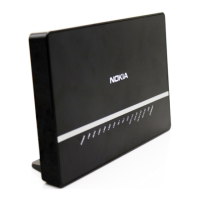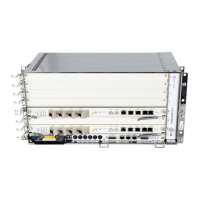FD 100/320Gbps NT and FX NT IHub Services Guide Virtual Private Routed Network Service
Issue: 13 3HH-11985-AAAA-TQZZA 517
7.10.9.33 next-hop-self
Table 530 next-hop-self command
Description This command enables BGP multipath.
When multipath is enabled BGP load shares traffic across multiple links. Multipath can be
configured to load share traffic across a maximum of 8 routes. If the equal cost routes available
are more than the configured value, then routes with the lowest next-hop IP address value are
chosen.
This configuration parameter can be set at three levels: global level (applies to all peers), group
level (applies to all peers in group) or neighbor level (only applies to specified peer). The most
specific value is used.
Multipath is effectively disabled if the value is set to one. When multipath is disabled, and
multiple equal cost routes are available, the route with the lowest next-hop IP address will be
used.
The no form of the command used at the global level reverts to default values.
Default no multipath — Multipath disabled.
Parameters max-paths — The number of equal cost routes to use for multipath routing. If more equal cost
routes exist than the configured value, routes with the lowest next-hop value are chosen.
Setting this value to 1 disables multipath.
Values: 1 — 8
Item Description
(2 of 2)
Item Description
Syntax [no] next-hop-self
Context configure>service>vprn>bgp>group
configure>service>vprn>bgp>group>neighbor
Description This command configures the group or neighbor to always set the NEXTHOP path attribute to
its own physical interface when advertising to a peer.
This is primarily used to avoid third-party route advertisements when connected to a
multi-access network.
The no form of the command used at the group level allows third-party route advertisements
in a multi-access network.
The no form of the command used at the neighbor level reverts to the value defined at the
group level.
Default no next-hop-self — Third-party route advertisements are allowed.
